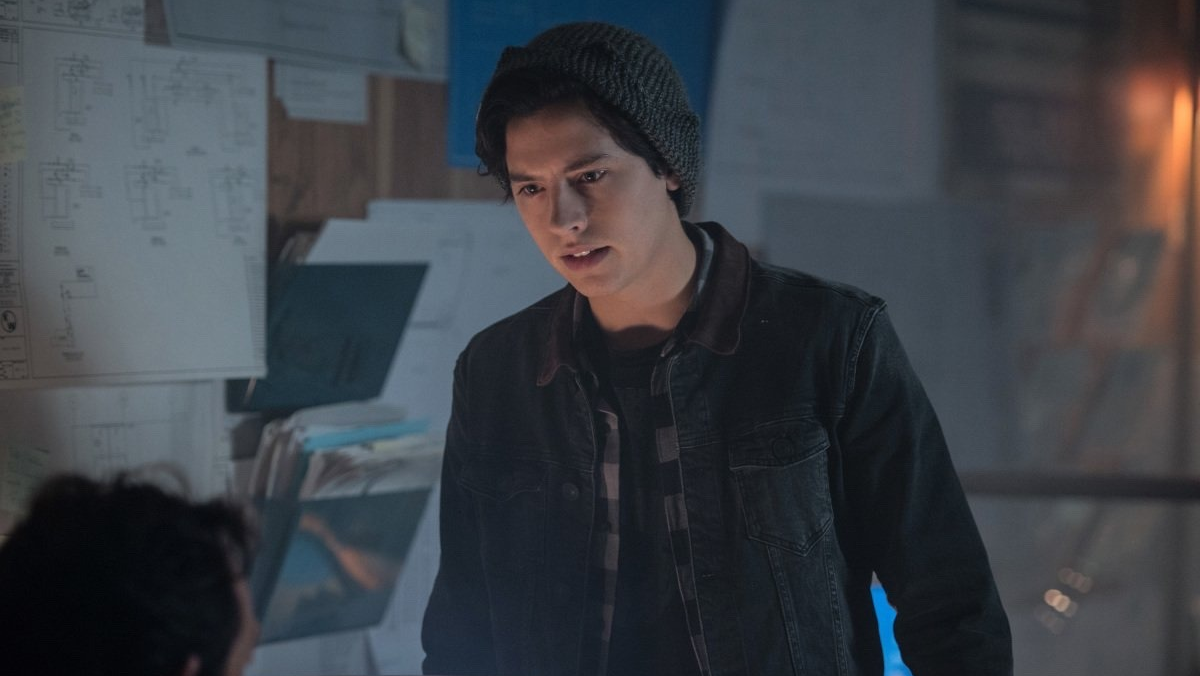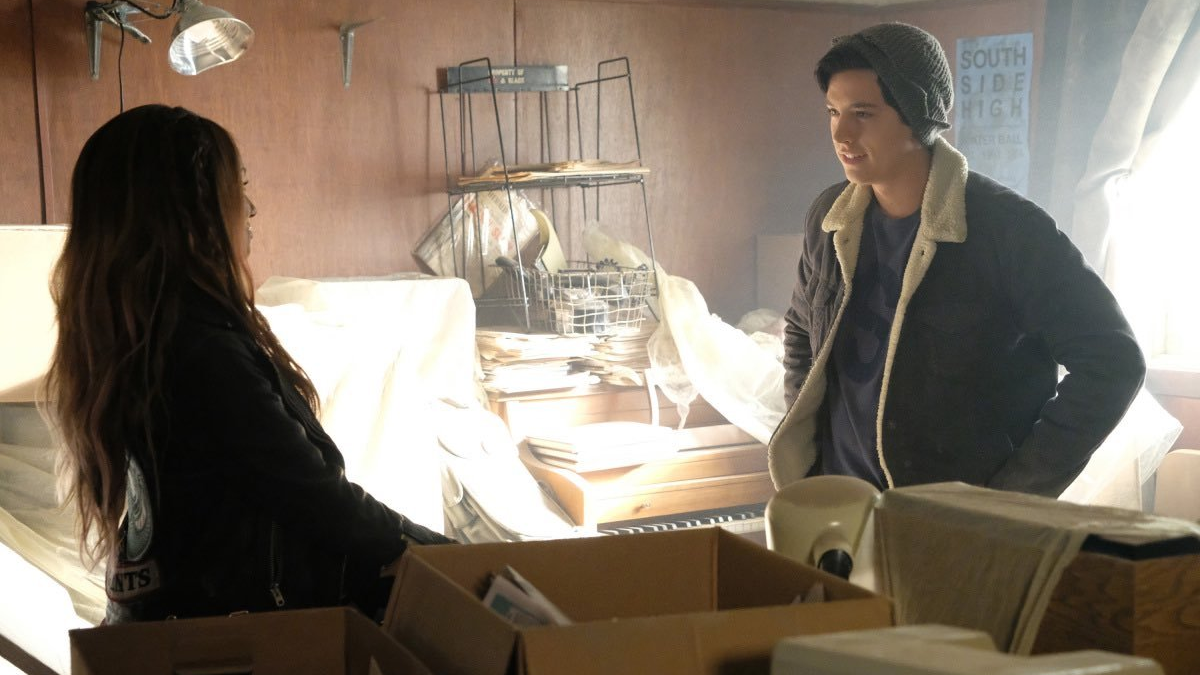Riverdale is a delightful mess of a show. Absolutely none of it should work, and yet season one was a confounding combination of high school soap opera theatrics and over-the-top drama, the likes of which we’ve never seen before. However, right up there with Archie’s music career is the bewildering choice to frame the whole show around Jughead’s narration.
All images: The CW
Riverdale is not a show overly concerned with realism. It’s a show where bad blood was spilled over a maple syrup company, which then turned out to be a front for drug smuggling. Season two introduced a drug called “jingle jangle”, which is basically meth but in Pixy Stix. And yet, the one truest thing in this show is that moody teen par excellence, Jughead Jones, is an amazingly bad writer.
The conceit introduced in the first episode of Riverdale is that Jughead is writing the Great American Novel about the events surrounding the death of Jason Blossom. Based on things said repeatedly in the first few episodes, he’s writing it as it happens, instead of, you know, after he actually knows anything. (How he knows about half the crap he’s narrating is a question for shows who care about the space-time continuum, not Riverdale.) In the third episode of the series, Jughead describes his book as “Riverdale’s very own In Cold Blood“. Let’s examine that claim.
The pilot leans very heavily on Jughead’s narration, only revealing it’s from his book at the end. Let’s start with the way the show opened:
Our story is about a town, a small town, and the people who live in the town.
From a distance, it presents itself like so many other small towns all over the world Safe. Decent. Innocent. Get closer, though, and you start seeing the shadows underneath. The name of our town is Riverdale.
Look at that first sentence. Look at it. You could literally start any book with that. Pop that sucker on The Andy Griffith Show and it works. And wait, Jughead, are you telling me your book isn’t about a small town that is exactly what it looks like? I’m shocked, shocked.
The best feedback I ever got from an editor was to “be ruthless with yourself” whenever you reach for the clichéd or the precious. No one has ever told Jughead that, obviously. Because narrator Jughead – who either knows things the character of Jughead can’t and is therefore actually a future Jughead, or is the current Jughead just… throwing stuff out there – speaks in nothing but clichés, generalities, and lists of information that are basically recaps for the audience. The lists of information are the best parts of the writing, because they’re just functional exposition. See how Jughead in the pilot continues:
And our story begins, I guess, with what the Blossom twins did this summer.
On the Fourth of July, just after dawn, Jason and Cheryl Blossom drove out to Sweetwater River for an early morning boat ride. The next thing we know happened for sure is that Dilton Doiley, who was leading Riverdale’s Boy Scout Troop on a bird-watching expedition, came upon Cheryl by the river’s edge. Riverdale Police dragged Sweetwater River for Jason’s body, but never found it.
So a week later, the Blossom family buried an empty casket and Jason’s death was ruled an accident, as the story that Cheryl told made the rounds. That Cheryl dropped a glove in the water, and Jason reached down to get it, and accidentally tipped the boat, and panicked, and drowned.
As for us, we were still talking about the “July Fourth tragedy” on the last day of summer vacation, when a new mystery rolled into town.
You can see the contrast. The middle two paragraphs are perfectly fine. For the audience of the TV show, they tell us the things we missed. “The next thing we know happened for sure” is a perfectly serviceable way to imply that Cheryl isn’t telling the truth, reinforced by the “the story that Cheryl told” description later.
But the beginning: “And our story begins, I guess.” Either it does or it doesn’t, Jughead. Either the story begins with Jason’s death or it actually begins before that – which, spoiler alert, it does. I hope Jughead went back and changed it when everything we learned about Jason was revealed later.
And then there’s the end. “As for us, we were still talking about the ‘July Fourth tragedy’ on the last day of summer vacation, when a new mystery rolled into town.” This, by virtue of the image the TV shows with the text – as well as nothing else new happening that day – is supposed to be Veronica and her mother. But she isn’t a mystery. No, seriously, she isn’t. Her mum does some sketchy things later on, but their arrival isn’t mysterious. It’s literally been in all the papers that her dad was put in gaol for shady business practices, and that’s why the remaining Lodges fled New York. Her dad’s appearance in season two, now that’s a “new mystery”.
Here’s part of Jughead’s narration from the end of the episode:
It was midnight, and my old friend Archie Andrews arrived at the one place in town that was still open. He was looking for the girl next door. Instead, he found me.
And then they talked about Archie’s love life. Is this in the book? Why? Other than to establish Betty as the girl next door and, I guess, that they used to be friends. The use of “my old friend Archie Andrews” implies that this is Archie’s first appearance in the book as it’s written. So the things in the show aren’t all in the book? That means it is all just vaguely prescient nonsense. There are psychics who do this better.

Here are three choice bits from Jughead’s season one writing, although there is an example of horror to be found in each episode’s narration. I’m not going to point out the clichés every time, but there are usually more than one per narration. From episode three:
Guilt, innocence. Good, evil. Life, death. As the shadows around Riverdale deepened, the lines that separated these polar opposites blurred and distorted.
The line between life and death is blurring? The rule of three is burned hard into every writer by every overeager English teacher, but the dead are not roaming the streets of Riverdale. (Yet. It isn’t like it’s something this show wouldn’t eventually get to.) If this is meant to be a metaphor for the way the reactions to the dead are influencing current actions, it is not established well in the text.
Episode seven has one of my favourites:
What makes a place feel like home? Is it warmth and familiarity? Some idealised, make-believe TV version of the American Dream? Is it love and acceptance? Or is it simple safety? Or it’s none of those things.
And it’s a place where the captain of the football team is murdered.
The construction here is so poor. The question that Jughead has posed is: What makes a place feel like home? The answer he provides is: “[A] place where the captain of the football team is murdered.” What Jughead means to say is that the idea of a “home” is a delusion we all buy into to make ourselves feel better, and it doesn’t exist. And the delusion is pierced when, you know, even the captain of the football team can be murdered in his “home”.
Instead, Jughead has said that home is where the murder is.
Here’s episode 10’s best:
Whether you believe in order or chaos, in the end, it’s the same. We are either in control of our lives, or merely think we are.
I am convinced this is just him reading a fortune cookie and accidentally adding it into his book.

Season two’s narration has every problem from season one, magnified. Without the structure provided by investigating Jason Blossom’s murder and the fallout, the show’s spinning its wheels a lot more, and so the weakest part of the show – the narration – has also gone down in quality. Here’s the thing from last week that pushed it over the top for me. Jughead starts off by saying, “Everyone’s afraid to say it, so let me be the first. There is a serial killer amongst us.” OK, so Jughead’s the first to say it, right? Presumably in the school paper he got revived the week before (more on that in a moment).
The narration goes on to cover Jughead grabbing research on serial killers in the library, and the librarian says that the murders are bad, but so is the vigilantism that’s followed it. And the narration picks up with: “There it was. Terror was seeping into the bedrock of Riverdale. A town hall meeting had been set by Mayor McCoy. People were afraid to walk the streets alone, especially as dusk approached. Shops closed early, locks were added to doors, suspicions between the North and South side deepened, fanned into flames by Alice Cooper.”
And suddenly, we’re in the past tense. So now this is the book? Or have we always been in the book? I know I said this show is exempted from the time-space continuum, but I’d like to see consistency in tense in the same scene at least.
But the prime example of bad writing this season, I think, is from “The Watcher in the Woods”.

First of all, this episode has Jughead transfer from Riverdale High to an impoverished Southside with barely any resources, where he decides to revive the school paper. Even the Riverdale High school paper was defunct in season one, but here all Jughead needs is to push the former adviser a bit, and boom, he’s restarted it. (Resources-wise, I had the thought, “Do a blog instead, it will reach more people anyway and is probably cheaper than a paper,” but then I realised that the extra space afforded by the internet would let Jughead write more and felt fine with the choice the show had made.)
Second of all, this episode had some of the worst Jughead writing so far. Here’s the start:
Every fairy tale comes with the same warning: Good children should never go into the woods alone. Stray from the path and who knows what you’ll encounter. A hungry wolf. A handsome devil. Or maybe something worse.
I can’t believe this episode wasn’t just called “Into the Woods” and the narration wasn’t just Jughead writing a paper on that musical. It is beyond clichéd now to frame things as a “dark” fairy tale. This chunk of Jughead’s narration also features the reappearance of Jughead adhering to the rule of three with slavish insistence.
The kicker is somehow worse than the opening:
Those kids in the fairy tales who go into the woods they don’t come back the same. They’re always changed in some fundamental way. Sometimes for the better. More often for the worse. That’s the common misconception about fairy tales. They very rarely have a happy ending.
This whole thing is just generic BS. It has context only as the TV show hitting the audience over the head with the theme of the episode with accompanying images. Within the universe of Riverdale, it makes Jughead an even worse writer than regular teenagers normally are.
Which, I will admit, the show does nail. The narration is exactly what would come from an edgy, teenaged outsider who declares him or herself a “writer”. Teens like that love to “reveal” that fairy tales are darker than the Disney version. It’s a snotty thing where they think they have peeled back a lie their parents foisted on them. I just don’t know why this is the thing Riverdale has decided to be realistic about. A few examples of Jughead’s bad writing would be sufficient to make the point about what kind of kid he is, but they have built the structure of most episodes around it. It’s like when there are shows within shows – the joke is funny for a second, but after a while, the audience is just stuck watching a bad show.
